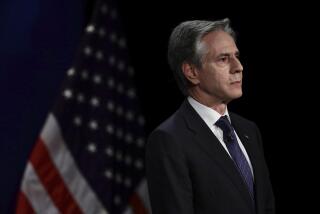Yeltsin Vetoes Bill Restricting Religions
- Share via
MOSCOW — President Boris N. Yeltsin on Tuesday rejected a controversial bill restricting religious freedom in Russia, apparently taking heed of protests by liberals at home and Pope John Paul II and the U.S. Senate abroad.
“It was not a simple decision to make,” Yeltsin said, adding that he had reluctantly decided to send the bill back to parliament because its current form goes against constitutional guarantees of freedom and equality of worship.
In the form passed by the parliament, Yeltsin said, the measure might have provoked religious conflicts. “Deputies and public figures have spoken out about this, and there was a critical response from abroad,” he said.
The U.S. Senate voted last week to deny Russia an estimated $200 million in aid if the bill became law. European countries and Western human rights groups have protested. The pope warned last weekend that the law “would constitute a real threat to the pastoral activities of the Catholic Church in Russia and to its very survival.”
The Law on Freedom of Conscience and Religious Association--passed in both houses of parliament by large majorities led by Communists and deputies fearful of foreign influence--explicitly favors Russia’s “traditional” forms of worship. It pledges respect for Islam, Judaism, Buddhism and the nation’s largest faith, Russian Orthodoxy.
All other denominations--which, unlike the sanctioned denominations, were not registered with the Soviet government 15 years ago--would face strict limitations on their abilities to operate.
“Congregations serving millions of believers would suddenly have no guaranteed legal right to own or rent land, maintain bank accounts, conclude contracts, conduct services in places such as hospitals, publish religious books or periodicals, or establish schools or seminaries,” said Lawrence A. Uzzell of Britain’s Keston Institute, which studies religious life in Russia.
Lawmakers argued that the law was needed to crack down on extremist sects such as the Aum Supreme Truth movement, which had been active in Russia and was blamed for releasing toxic gas in a Tokyo subway. But opponents argued that Russia already has adequate laws against criminal activity.
Opponents argued that the real victims of the law would be Western groups such as the Mormon Church, which has missions in Russia, and indigenous Russian churches--minority Orthodox, Baptist or Pentecostal groups.
Parliament, which is on vacation, is expected to reconsider the bill when it resumes work in September. It could revise the bill, kill it or overturn Yeltsin’s veto with a two-thirds majority in both houses.
While Yeltsin’s veto ends this battle for religious freedom, the war is far from won. Yeltsin made clear he still shares the belief that the Russian Orthodox Church must be protected from potentially hostile outsiders.
“There is no doubt that [this] law is necessary,” he said. “It must protect the moral and spiritual health of Russians, put reliable blocks on the way the penetration into our country of radical sects is inflicting serious damage to the health and psyche of our citizens.”
The Russian Orthodox patriarch of Moscow, Alexi II, is a close political ally of Yeltsin and an outspoken supporter of the bill. Appearing on NTV television Sunday, Alexi emotionally compared foreign religious groups preaching in Russia with the eastward expansion of the North Atlantic Treaty Organization.
More to Read
Sign up for Essential California
The most important California stories and recommendations in your inbox every morning.
You may occasionally receive promotional content from the Los Angeles Times.













